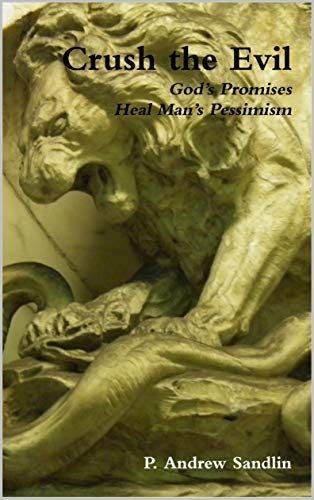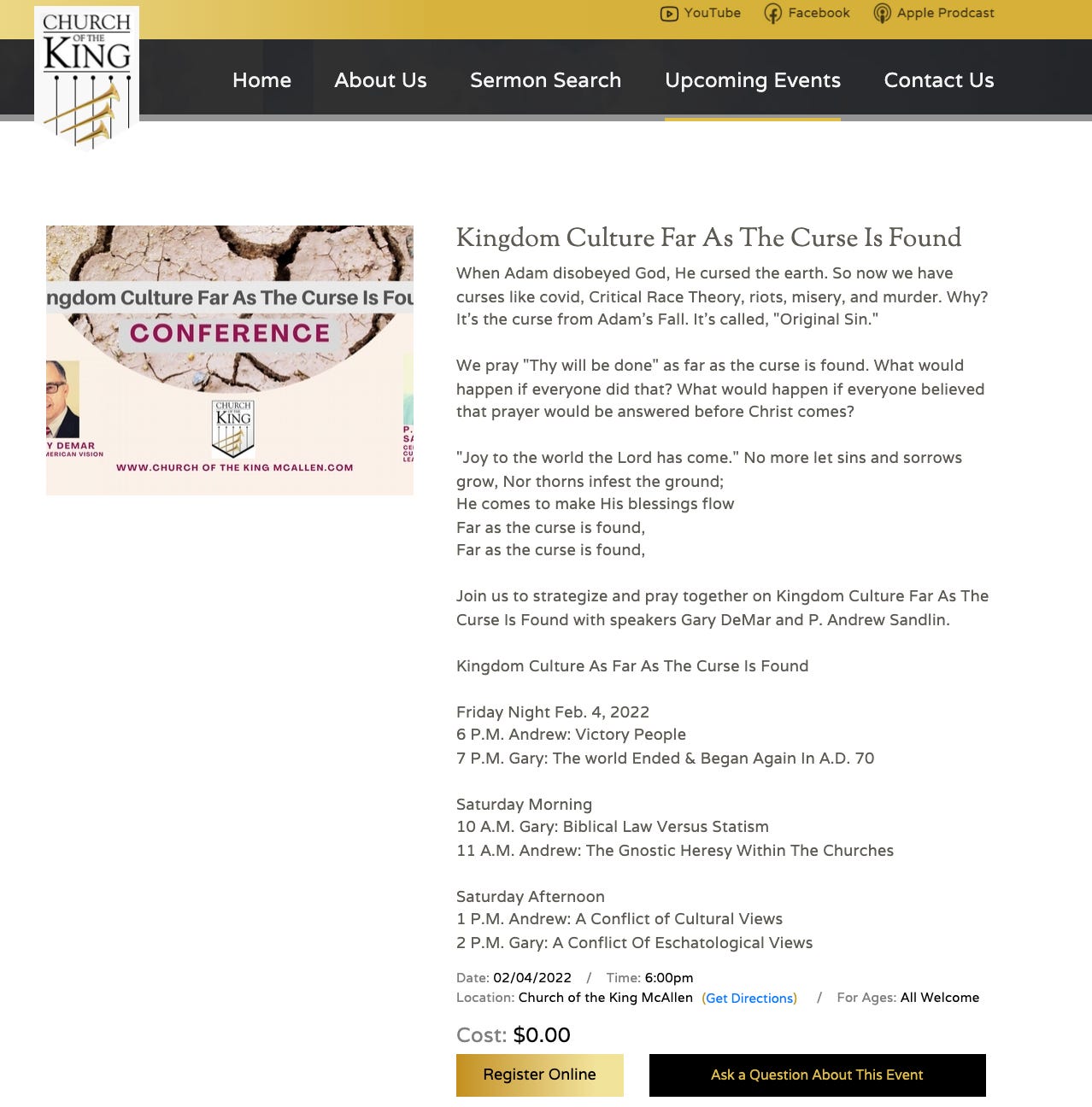
Recovering Regal Soteriology
To lure sinners with the delights of eternal life while obscuring the demands of Christ’s Lordship over them is a supreme evangelistic cruelty.
Dear friends and supporters:
Last week I addressed “The Kingdom Point of View,” and just now I wish to elaborate on one category of the Kingdom. The Kingdom of God is on my mind since it’s also the upcoming theme at conferences I’ll be addressing these next two weekends: the first in Corpus Christi, Texas and then in McAllen, Texas. (More information far below.)
Biblical soteriology (salvation doctrine) is Kingdom, or regal, soteriology. In today’s church, this biblical truth is not given the emphasis it deserves. I hope to help correct that omission with the following assertions and inspire a recovery of regal soteriology.
Kingship at Conversion
First, salvation is not identical to the gospel, but a central subset of it (see my essay “Gospel or Salvation?”). The gospel is the Good News that God in Christ’s past redemptive acts and his present heavenly rule in overturning the Edenic fall and restoring and enhancing pre-fall Eden to engulf the earth. But this entails advancing the kingdom, because man’s primal calling is the cultural mandate (Genesis 1:27–28): God-honoring man is God’s deputy in exercising benevolent dominion over earthly creation. God is the universal King, and we are his regal representatives:
For You [God] have made him [man] a little lower than the angels,
And You have crowned him with glory and honor.
You have made him to have dominion over the works of Your hands;
You have put all things under his feet….(Psalm 8:5-6)
Of course, God’s principal human kingly representative is his Son, God in the flesh (Hebrews 2:1–9), but since believers are united to Christ by faith, we share in his present rule (Ephesians 1:18–23, 2:4–7).
This regal individual soteriology begins right at our conversion. When we are converted, that is, are changed from, and change ourselves from (Acts 3:19), children of Satan to children of God under the Spirit’s gracious operation, we recognize a new King. Satan is no longer our king, our lord. Salvation isn’t just about rescue from hell and the promise of heaven; it is more fundamentally about switched allegiances: from the usurpatory king Satan to the legitimate King Jesus.
This means that Jesus Christ is Lord of all salvation, including our salvation, and including from the moment of conversion.1 When we trust Christ by faith at our conversion, we’re necessarily submitting to him as Lord and King.
Lordship Salvation
This was part of the Lordship Salvation controversy of the 80s, in which the youthful pastor John MacArthur championed the biblical, pro-Lordship view, and Zane Hodges of Dallas Seminary advocated the non-biblical, anti-Lordship view.
But this actually was the revival of an earlier Lordship Salvation controversy from the 50s, when the zealous Arminian writer A. W. Tozer took on the dispensational and “higher-life” establishment. Long before MacArthur was saying it, Tozer was asserting for all to hear that Jesus Christ isn’t just our Savior but also our Lord, and Savior precisely because he is Lord.
The biblical term for Lord is equivalent to “master,” and all who first heard this word in their native languages of the New Testament era would’ve understood precisely what it meant. To confess Jesus is Lord as a prerequisite to salvation is to profess submission to his rule as God and King. Jesus taught this in Matthew 16:24–27
Then Jesus said to His disciples, “If anyone desires to come after Me, let him deny himself, and take up his cross, and follow Me. For whoever desires to save his life will lose it, but whoever loses his life for My sake will find it. For what profit is it to a man if he gains the whole world, and loses his own soul? Or what will a man give in exchange for his soul? For the Son of Man will come in the glory of His Father with His angels, and then He will reward each according to his works.
And if we believe our Lord [!] is talking about conditions for discipleship but not conditions for eternal life, please note that if we refuse to lose our lives for (that is, submit to) Jesus Christ, we’ll forfeit our soul and life.
Conditions of eternal life are conditions of discipleship. The one is identical to the other. To trust Christ is to become a lifelong disciple of Christ. This necessitates submission to Jesus as Lord at the very inception of conversion. Because the unmitigated global success of the kingdom is God’s plan for redemption in his Son, his Lordship in individual soteriology begins right at the point of conversion.
To lure sinners with the delights of eternal life while obscuring the demands of Christ’s Lordship over them is a supreme evangelistic cruelty. Sinners are entitled to know that in trusting Christ alone for salvation they’re trusting him as Lord-King-Savior. It’s not exegetically permissible to isolate Jesus’ offices during open-air evangelistic preaching any more than it is to isolate them in Sunday sanctuary edification preaching. Jesus is always and everywhere Savior and Lord.
Regal soteriology begins for the sinner right at the point of gospel preaching and Christian conversion.
Kingly Justification
The marginalizing of the category of justice in modern conservative soteriology is evidenced in the deemphasis on soteriological justification. It’s true this doctrine in Lutheran and in many Reformed quarters occupies a predominant (too predominant) place,2 but elsewhere it is eclipsed by regeneration, or being born again, or even by the “felt needs” demanding therapeutic soteriology: Christ died on the cross to deliver us from personal failure and depression and a poor self-image.
Paul’s soteriology in the book of Romans begins by outlining man’s dilemma before God: he stands under righteous judgment for his sin (ch. 1). Degradation and sadness and a poor self-image and addiction and disappointment and hatred are all consequences of sin. But the chief consequence is that when man sins, he elicits divine judgment, including eternal judgment in hell.
The question then is: how can a sinner be right with God? According to Paul, the answer is justification: the judicial declaration of justice, or righteousness. On the basis of our Lord’s sacrificial death (Romans 3:21–26) and bodily resurrection (Romans 4:23–25), we are declared righteous in that we are united to his sacrificial- and resurrection-righteousness, by faith alone, and not by our works (Ephesians 2:8–19).3
Justification and the Kingdom
How is justification related to the kingdom? Just this: in the ancient world, the king was also the realm‘s highest judge, unlike in the modern liberal West, where the judiciary is separated from the state. This is why the ancient Near Eastern king sat on a throne in a royal court (remember Ahasuerus in the book of Ester, for example). The royal palace included the king‘s courtroom.
In the Bible, sinners expose themselves to the cosmic King’s righteous judgment, but he levels that judgment on his Son, and in union (by faith) with him, who absorbs that judgment on our behalf, we’re freed from sin’s penalty (2 Corinthians 5:21).
Yet if we see man’s existential dilemma not chiefly as one requiring pro-action by the cosmic King’s courtroom justice but as his relieving our distresses, justification won’t seem all that important to us. And God’s wrath displayed at the cross will appear gratuitous and misguided.
Liberalism’s Soteric Injustice
In 2013 the Presbyterian Church USA decided to drop the recent well–known hymn “In Christ Alone” from their new hymnal. The sticking point was the word “satisfied”: the original lyrics say that “on that cross, as Jesus died, the wrath of God was satisfied.” The Presbyterian Committee on Congregational Song wanted to substitute the words, “the love of God was magnified.”
This essentially “progressive” denomination was offended that Christ’s death on the cross satisfied God’s wrath against sin, despite biblical texts like:
Surely He has borne our griefs And carried our sorrows; Yet we esteemed Him stricken, Smitten by God, and afflicted. But He was wounded for our transgressions, He was bruised for our iniquities; The chastisement for our peace was upon Him, And by His stripes we are healed. All we like sheep have gone astray; We have turned, every one, to his own way; And the Lord has laid on Him the iniquity of us all….
Yet it pleased the Lord to bruise Him; He has put Him to grief. When You make His soul an offering for sin, He shall see His seed, He shall prolong His days, And the pleasure of the Lord shall prosper in His hand. He shall see the labor of His soul, and be satisfied. By His knowledge My righteous Servant shall justify many, For He shall bear their iniquities. (Isaiah 53:4–6, 10,11, emphases supplied)
And in the New Testament, Peter writes, invoking Isaiah 53:
[Christ] Himself bore our sins in His own body on the tree, that we, having died to sins, might live for righteousness — by whose stripes you were healed. For you were like sheep going astray, but have now returned to the Shepherd and Overseer of your souls. (1 Pet. 2:24–26)
The King is the cosmic Judge, and there’s no greater issue of our existence than to be right with him, and to be right with him we must be righteous as he is, and to be righteous as he is, we sinners must have credited to us the righteousness of his righteous Son.
In justification, that’s precisely what God does.
(continued below)
This short book shows that due to the promises of the Bible in Jesus Christ's death and resurrection, Christians must not be pessimistic about either individual or cultural evil, which God is progressively crushing.
(continued)
Crucifixion as Kingship
Christ’s death on the cross was the greatest act of humility, and humiliation, in world history:
Let this mind be in you which was also in Christ Jesus, who, being in the form of God, did not consider it robbery to be equal with God, but made Himself of no reputation, taking the form of a bondservant, and coming in the likeness of men. And being found in appearance as a man, He humbled Himself and became obedient to the point of death, even the death of the cross. (Philippians 2:5–8)
But it was equally an act of exaltation. Our Lord prophesied:
Now is the judgment of this world; now the ruler of this world will be cast out. And I, if I am lifted up from the earth, will draw all peoples to Myself.” This He said, signifying by what death He would die. (John 12:31–33, emphasis supplied)
Paul makes this crucifixion-victory even more explicit:
And you, being dead in your trespasses and the uncircumcision of your flesh, He has made alive together with Him, having forgiven you all trespasses, having wiped out the handwriting of requirements that was against us, which was contrary to us. And He has taken it out of the way, having nailed it to the cross. Having disarmed principalities and powers, He made a public spectacle of them, triumphing over them in it. (Colossians 2:13–15, emphasis supplied)
Though Christ’s death was a humiliation for his person, it was a triumph for the plan of God, and since Jesus is God, it was equally Christ’s triumph. The cosmic King trounced the principalities and powers, that is, Satan and his minions. How? By definitively crushing the power of sin. This regal death fulfilled Genesis 3:15, the seed of the woman crushing the head of the seat of serpent: Satan’s head.
Therefore, Christ’s death cannot be limited to a humble, passive acquiescence. Jesus did indeed acquiesce to the Father’s will, but in so doing, he marched toward victory not just for individuals, but for the entire world.
His dying a humiliating, abhorrent death was an exercise in cosmic kingship by vanquishing Satan and his hosts.
Pre-Consummate Gospel Success
Finally, many Christians are timid about the pre-consummate success of the gospel. They believe the gospel cannot be pervasively successful, but only a few will be saved (see B. B. Warfield’s refutation), and the kingdom is destined to only beggarly boon until the eternal state.
But the Bible promises great gospel success, and great cultural victory even before the consummation. Isaiah 65:17ff prophesies a new heavens and a new earth, though not the final eternal version, because it’s a time of great righteousness, peace, enjoy, where death is reduced, but the curse, though diminished, simultaneously survives, and the wicked are marginalized, though not eliminated. This is obviously a pre-eternal, temporal reality.
Similarly, Paul writes in 1 Corinthians 15:22–28,
For as in Adam all die, even so in Christ all shall be made alive. But each one in his own order: Christ the firstfruits, afterward those who are Christ’s at His coming. Then comes the end, when He delivers the kingdom to God the Father, when He puts an end to all rule and all authority and power. For He must reign till He has put all enemies under His feet. The last enemy that will be destroyed is death. For “He has put all things under His feet.” But when He says “all things are put under Him,” it is evident that He who put all things under Him is excepted. Now when all things are made subject to Him, then the Son Himself will also be subject to Him who put all things under Him, that God may be all in all.
Paul lays out the sequence of redemptive history: (1) Christ dies and rises again in great victory. (2) In the present age, he rules progressively over the earth, until all of his enemies are subjugated. (3) Christ then returns in great regal glory, ushering in the eternal state.
The Eschatological Diminution of Redemption
This gospel success is the effect of Christ’s death and resurrection. There’s a sobering inference from this fact: those who deny the pre-consummate success of the gospel are actually diminishing the efficacy of the cross and the resurrection. They often think that because they stress individual salvation, that Christ died and rose to create a righteous people and to take them to heaven when they die, they’ve given due honor to Christ’s atonement and resurrection.
But they haven’t. Unless we stretch forward in history the regal rule of the crucified and risen Lord as he gradually subordinates all his enemies in the current age, we haven’t captured the full efficacy of redemption.
The crucifixion and resurrection are more potent than most Christians suppose — so potent, in fact, that evil in the world, not just in families and churches, can’t withstand it.
Conclusion
We may not isolate soteriology from Christ’s kingdom nor his regal claims. We may not seal off God’s kingdom to old covenant Israel’s commonwealth, nor postpone it until Christ returns to establish an alleged thousand-year rule on earth.
When Christ died and rose again, executed at the focal point of mid-history, he trounced Satan and his minions and the world and death. But the implications of this victory are worked out only progressively in history and will come to their fulness is only in the eternal state.
Jesus is King at salvation (1) when he exercises his Lordship claims at our conversion; (2) when his death and resurrection secure our justification, our “getting right with God”; (3) and when his death trounces the principalities and powers.
Any soteriology that reduces or marginalizes these predominant claims of King Jesus does despite to the kingdom of God — God’s plan for his world.
Will you consider a tax-deductible donation to CCL via PayPal or Venmo? Or mail a check to CCL, Box 100, Coulterville, CA 95311. God uses you to keep us going — and expanding.
Personal
I’ll be preaching this Sunday at City Church-Corpus Christi on “Captivated by the Kingdom.” To see this Sunday’s live-streamed sermon, click here. This is a “soft open” for our conference starting next Friday (see below).
I hope by late spring CCL will publish our significant essay collection Failed Church: Restoring a Vision of Ecclesial Victory. Contributors include David Bahnsen, Joe Boot, Uriesou Brito, Ardel Caneday, Gary DeMar, Doug Enick, John Frame, George Grant, Brian Mattson, P. Andrew Sandlin, Levi Secord, Jeffery J. Ventrella, and Roger Wagner.
Sharon and I enjoyed, as always, our trek across the desert Southwest, perhaps our favorite place in the country.
God’s blessings on each of you.
I hope to write again on the Kingdom next week. Please pray for me and CCL.
For the King and His Kingdom,
Center for Cultural Leadership
More information here.
More information here.
More great stuff:
The Center for Cultural Leadership site is here.
My Amazon author page (print and digital) is here.
You can find my sermons and lectures at my YouTube channel.
Sign up to get my blog updates here.
Here’s my Twitter feed.
If you want to get the free exclusive hard copy publication Christian Culture, please send me a Facebook private message.
The CCL phone number is 831-420-7230.
The mailing address is:
Center for Cultural Leadership
P. O. Box 100
Coulterville, CA 95311
The Father is King even earlier in our salvation, from our election in eternity past (Ephesians 1), but I’m focusing here on our subjective appropriation of salvation within history.
The Lutheran assertion that justification is the “article of the standing or falling church” and Calvin’s notion that it’s “the principal hinge of religion” are bold, not biblical, views.
“Faith alone” means faith is the only means of subjectively appropriating justification. It does not mean faith itself is ever without works, as James makes clear. See Norman Shepherd’s The Way of Righteousness.













